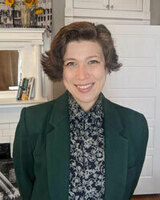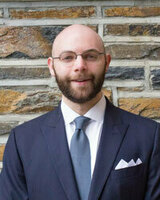Welcome back! Meet our incoming scholars
The start of a new school year brings us the opportunity to warmly welcome our incoming visiting scholars and Ph.D. students.
Mellon Fellow

Our 2022–23 Mellon Fellow is Mireille J. Pardon, Assistant Professor of History at Berea College. Professor Pardon's project examines how people thought about homicide in fifteenth-century Flanders, and how changes in the perception of killing over time impacted judicial practice. Medieval reconciliation procedures, a feud-like understanding of violence, and an emphasis on pecuniary penalties declined as spectacular, bodily punishment took center stage. Drawing on the wealth of archival resources for late medieval Flemish cities, her work explores slow cultural shifts in concepts of honor, masculinity, and the common good to give a new perspective on the birth of early modern punitive justice.
Graduate Program

Bruce McCuskey comes to the MI from Duke Divinity School. He studies the history of late ancient, medieval, and renaissance philosophy, especially the interplay between philosophical thought and revealed and canonical texts. His research focuses on the distinct ways that Jews and Christians retrieved and the Platonic corpus in the fifteenth and early sixteenth centuries. The reintroduction of new philosophical genres like the Platonic dialogues and the recovery of the late antique NeoPlatonic commentary tradition coincided with the rise of Christian Hebraism and Jewish debates over the value of Kabbalah. These developments generated re-examinations of medieval Scholastic debates on the divine attributes, universals, Christology, and the Eucharist, as well as distinctive encounters between Jews and Christians. He is also interested in the relationship of these debates with late medieval science.

Justin Michael Smith joins the Medieval Institute from Holy Cross Greek Orthodox School of Theology. He focuses on areas of critical change in East-West Christian relations, especially as these developed in the East. Justin is particularly interested in Byzantine ecclesiology and its development during key historical moments in the middle and late-Byzantine periods, such as the Byzantine responses to papal primacy between the Second Council of Lyon (1274) and the Council of Ferrara-Florence (1438–1439). While formally trained in biblical exegesis and patristic theology, Justin seeks to approach East-West Christian relations holistically by integrating socio-political, theological, and ecclesiological factors and motivations.

Milanna Fritz joins the Medieval Institute from the Theological Studies Program, from which she earned a Master's Degree. She intends to explore the development of middle Byzantine monastic culture and theology and how pilgrimage texts and epistolary accounts composed by medieval mendicant authors describe Christian-Muslim interactions.
The Medieval Institute was the first of its kind in the United States and remains one of the leading centers in North America for the advanced study of medieval culture. The graduate program provides students with superb technical training, but it also equips them with a holistic vision of the Middle Ages, grounded in a mastery of sources and languages and extending to the whole of its life and culture.
The Medieval Institute was the first of its kind in the United States and remains one of the leading centers in North America for the advanced study of medieval culture. The graduate program provides students with superb technical training, but it also equips them with a holistic vision of the Middle Ages, grounded in a mastery of sources and languages and extending to the whole of its life and culture.
Students in the Medieval Institute pursue the Ph.D. in Medieval Studies, a rigorous, interdisciplinary degree with a focus on one of the classic disciplines: history, Latin or vernacular literature (English, Italian, German, Spanish, French), theology, philosophy, music, or art history. They receive training from leading experts in their field while researching and writing in one of the best libraries in the world for medieval studies.
Graduates of the Medieval Institute are extremely competitive on the job market, and currently hold positions throughout the United States, Canada, and Europe.
The Medieval Institute welcomes applications from students of high academic ability who wish to pursue a career teaching and researching the Middle Ages. Generous fellowship support and light service demands allow students to devote themselves fully to their course of study.